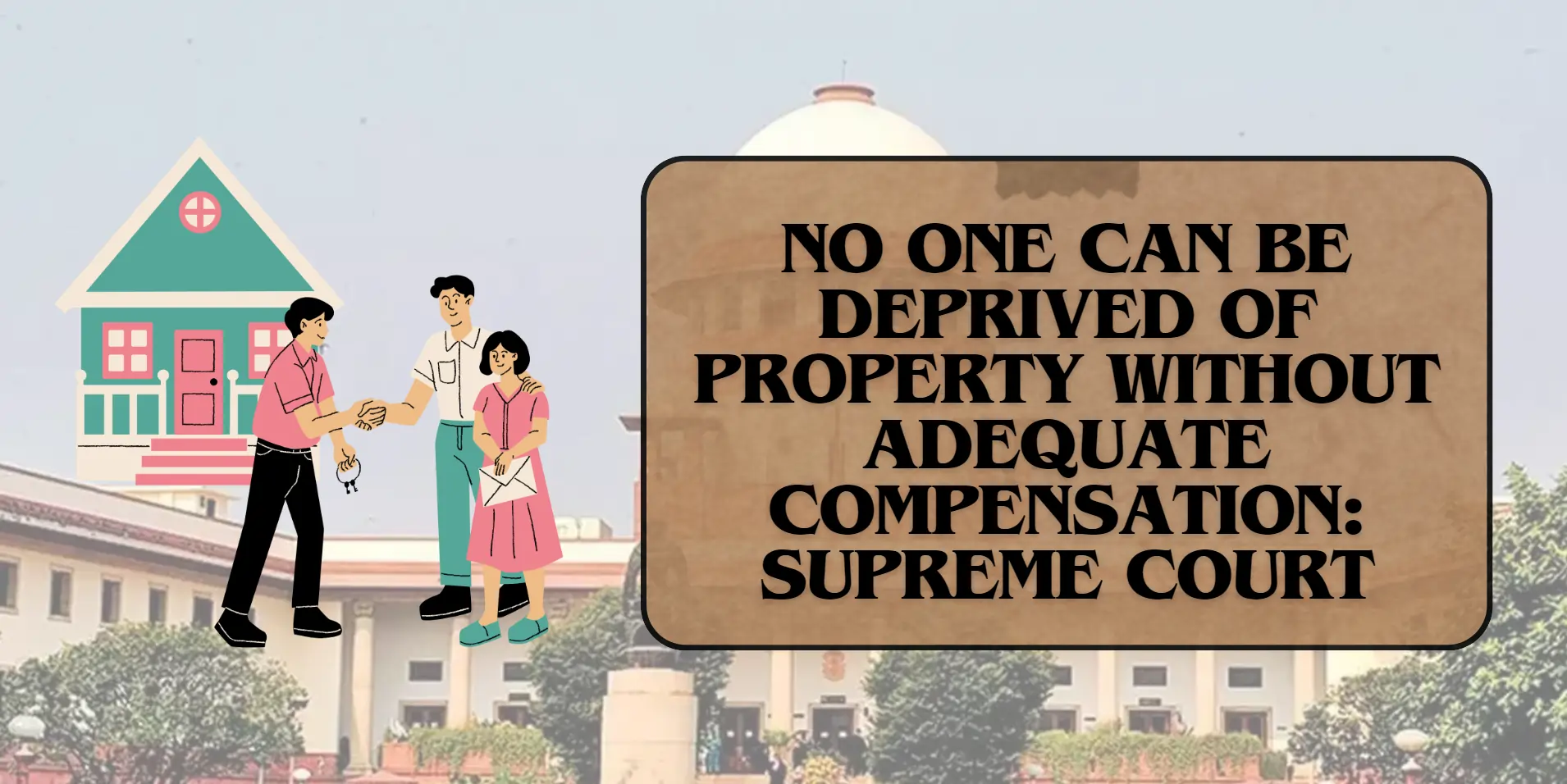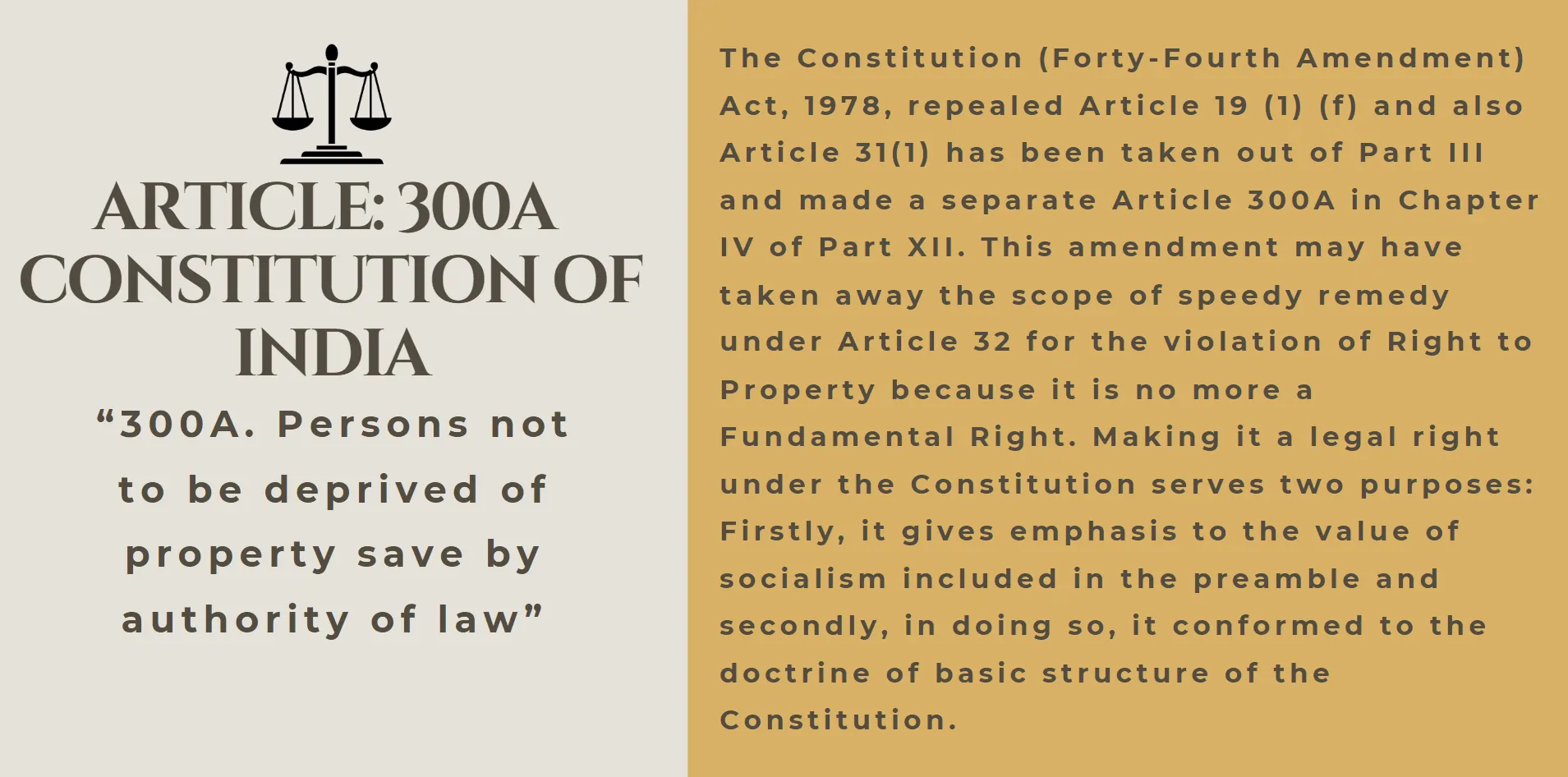
Over time, ownership of property has always been an important constituent of human civilization given that they help foster stability; economic and personal, and liberty. In India, this principle is deeply embedded in the Constitution, primarily through Article 300A, which states: ’No person shall be held to be deprived of his property there must be law that allows it.’ This constitutional provision guarantees that their deprivation of property is lawful and more importantly that it is done with adequate compensation. The Supreme Court of India again upheld this principle, extending the sanctity of the property owner rights and the correct compensation to the property owners when such rights are restricted.
Historical Context
Thus, the timeline of the property rights’ evolution in India can be described dramatic and critical at the same time. After Independence, it was a fundamental right under Article 31 of the INDIAN CONSTITUTION. Yet this was changed in 1978 by the 44th Amendment Act that demoted property rights from being a fundamental right under the Constitution to a constitutional right provided in Article 300A. It was intended to support land reforms and reduce social injustice; however, it seemed to require an efficiently protective solution for property owners against potential unlawful state intrusions.
The Supreme Court reaffirmation
The apex Court in India recently ruled that no undeserving person can be evicted from his home or his property be taken away without being duly compensated. This decision originates from a case when the government uses its power to acquire land compensation for public use purposes; the compensations have been regarded inadequate by the owners of the seized piece of land.
The Supreme Court asserted strongly to the proposition adverting to the fact that though the power to take property for public use belong to the state, this power is not exhaustive of substantial justice. The judiciary supported that adequate compensation does not mean monetary paid in simple ways but it involves respect for individual rights as well as the understanding of sacrifices of property owners for the benefit of the other people.
Principle of Reasonable Remuneration
The notion of reasonable remuneration can be defined by different principles to control the appropriate thing. The compensation has to as reasonable as the market prices as at the time of taking over the property by considering factors like area of land, number of acreage, the prospect of developing the land, and loss of business due to its acquisition etc. In addition, establishing compensation should be accomplished fairly without bias by engaging selected property owners so that they can dispute any unfair compensation.
Future acquisitions
The consequences of the recent Supreme Court verdict for property rights concerning future land acquisitions are of outmost importance. The trend established is that the government has to respect fairness and equity to a level that property owners are not suffering significant loss. It also gives a word of caution and prompts to legislative bodies all over the country to enact laws and formulate policies that are in tandem with the supreme law of the land protecting the common citizen but at the same time facilitating the much needed developments.
The judgement also opens up the area of land acquisition laws which should provide for the public interest and not just the interest of one person. The passage of the Right to Fair Compensation and Transparency in Land Acquisition, Rehabilitation, and Resettlement Act, 2013 is in this context a giant leap in placing structured frameworks relating to land acquisition and compensation. That is why it is necessary to conduct the constant evaluation and improvement to reply to the new challenges and guarantee the effectiveness of the existing law.
Understanding Article 300A: Safeguarding Property Rights
The Indian legal provision which is very significant to one’s property is the Article 300A of the Constitution of India. What was formerly known as a fundamental right under Article 31 (now deleted) became a constitutional right under Article 300A in order to effect land reforms and reduce further inequalities in society.
To understand the idea of Article 300A it should be noted that it is aimed at safeguarding the rights of citizens against arbitrary activities of the state. It preserves that no person shall be deprived of his property except where the law so provides that it shall be lawful, just, and reasonable to do so. This implies that the state can only take private property for public use, must do so under laws and must do so arbitrarily. Most importantly, it also requires a party to provide a reasonable amount for ownership of the property as this comes under the equity principle.
The Apex Court has involved considerably in enforcing and interpreting Article 300A. In many leading cases, it has been held by the court that compensation is to be fair, on the basis of the market value of the property, displaced with regard to the acquisition process being open and involving public participation. This cross examination curtails arbitrary exercise of power by the government and also ensures that property owners’ rights are protected.

Article 300A thus maintains a fine equilibrium between personal ownership of property and the needs of the state which requires land for public uses. It makes sure that whereas the state can embark on the development agenda and social economic reform agenda, it cannot do so in a manner that is prejudicial to property rights of individuals. This section propounds Indian’s democracy with the rule of law, and, individual freedom despite collective requirements.
Article 300A is a clear proof that the Indian Constitution produces justice, fairness, and dignified treatment of the individual. It acts as a safeguard against arbitrary deprivation of property, ensuring that any such action is backed by law and accompanied by adequate compensation. This provision does not only guard the interest of property owners but also re-affirms the democratic tenets and the principles of the rule of law.
Is the Right to Property a Fundamental Right in India?
The right to property is a unique constitutional right among all the constitutional rights that is facing shifts in Indian perspective. Traditionally, property rights were accorded fundamental rights under Article 31 of the Indian Constitution but the changes over the years downgraded it. Even though the right to property is no longer a fundamental right under the constitution of India it is still a constitutional right under Article 300A. Our proposal of such a shift is in the context of understanding India’s attempt to strike a balance between ‘entitlement based private property’ and the socioeconomic development of the country.
Historical Evolution
When the Constitution of India came into force 1950 the right to property was among the component of the part III of the Indian Constitution; however, it was not an absolute right, the government could not take away a man’s property except by law. This provision was meant to shield people from whimsical exercises of state power and an appropriate measure to stabilize the economy. However, in the course of years significant changes of constitution occurred, which signifies land reforms and other productive resources that have made property rights relatively less absolute.
The greatest shift was witnessed after the passing of the 44th amendment act of 1978 which did away with article 31 and brought into being article 300A. This amendment changed the right to property from a provision of the Constitution right. The aim was to enable the government acquire land for public use whilst at the same time provide satisfactory compensation to the owners of the land. And in doing so, the amendment was intended to achieve a reasonable balance between the rights of people and the demands of society.
Current Legal Framework
From Section 300A, any person cannot be denied of his rights and particularly the right to property without the provision of law. However this provision protects property rights, it certainly does not offer the same kind of protection as the one offered by a fundamental right. Fundamental rights, listed in Part III of the Constitution, are subject to greater judicial scrutiny, and any violation can be directly challenged in the Supreme Court. However, constitutional right infringements, for instance as embodied by Article 300A, ordinarily call for legal remedies.
However there is no denying in the fact that the right to property still holds its position as an important human rights protection mechanism. The Supreme Court of India has consistently held that any deprivation of property must be lawful, reasonable, and accompanied by adequate compensation. Several cases have, therefore, strengthened the principles of reasonableness and the procedural fairness of the acquisition of properties while eliminating State discretion that may allow property owners to suffer the tyranny of prejudice and whim.
Implications
These changes are not insignificant the idea of moving from a constituent one to a constitutional right has bearing. On one hand it gives power to the government to control the issues like land reform and development with social, economic problems. It, on the other hand, shifts more burdens to the judiciary to hold potential abusers of power accountable to property owners.
These protections are further enhanced by The Right to Fair Compensation and Transparency in Land Acquisition Rehabilitation and Resettlement Act of 2013 as it specifically puts the statutory guidelines that regulate the process of land acquisition, rights of the affected people, adequate compensation rates and ensure transparency.
A Special Land Acquisition Officer (SLAO)
Special Land Acquisition Officer appointed by the state government, the SLAO is responsible for ensuring that the acquisition of land for public purposes is conducted fairly, transparently, and in accordance with the law. This role is particularly important more so under the provisions of the constitution particularly Article 300A which prohibits anyone from having their property removed from them without accordance to the law.
Appointment and Jurisdiction
The SLAO is usually an official of the state government and is usually given a district or a region to cover. SLAOs, an important organ in the jurisdiction of the land acquisition matter falls under the province of the SLAO. This makes it easy for the process to be localized hence enable the SLAO to independently manage and monitor the acquisition proceedings.
Key Responsibilities
- Conducting Surveys and Assessments: The role of the SLAO includes the compilation of specific surveys and assessments of the particular land. Some of these procedures include; establishment of title to the property, estimation of market value of the property and assessment of the area of the land needed for the public purpose.
- Issuing Notifications: The SLAO notifies the owners of the subject property preliminarily of the intended acquisition. It has details pertaining to the necessity of acquisition, land extent needed, and the usage of the property owners.
- Hearing Objections: Property owners only have a right to object to the proposed acquisition. The objections can be filed with the SLAO and then the SLAO deals with the concerned property owners whenever there is a concern raised. This makes it possible to ensure that so as to come up with the outcomes more so the rights of the property owners are fulfilled.
- Determining Compensation: Perhaps one of the highest powers vested in SLAO is to set or recommend the amount of compensation payable to the property owners. The compensation has to be reasonable with referred to current market value of the property at the specificity of the time of acquisition. The SLAO has the responsibility of making sure that the compensation is reasonable and property owners are not NEGATIVE affected.
- Preparing Awards: Once the amount of compensation is agreed upon then SLAO drafts an award containing a description of the compensation as well as the property owners’ rights. It is then forwarded to the property owners and the state government with the award issued to the successful bidder.